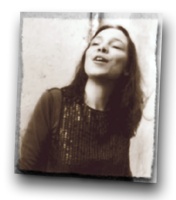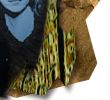 |
Interview #3 (2003)
Lhasa de Sela Unofficial Homepage
Cédric
: Many people have asked me for news of you since the creation
of this website in 1998, because there has been no news
of you in the media for the last few years. In a few words,
can you say what you were up to during this period ?
Lhasa : In January 1999 I went to France, to work on
creating a show with my three sisters who are circus performers,
and three other friends, in the company called " Pocheros
". There is a whole movement of " new circus " that is especially
strong in France, circuses that combine traditional circus
skills with theatre and do not use animals.
|
We worked like crazy for six months to prepare
the show and then went on tour with it, with a circus tent and caravans
and children and dogs ! It's a life that is very different from
the touring life of a musician - your family is with you, travelling
is slow, setting up camp, putting up the circus tent, bleachers,
lights, makes you set down roots in every place you play. You can
be sipping tea in your home five minutes before the show !
The show ended up being kind of slow and contemplative,
one of my sisters danced on the tight wire in high heeled shoes,
another did contortion on a ladder, another flew accross the ring
in a strange boat with one wheel and there was a dog that sang and
an act with dangerous balancing and cups of tea and a man who ate
his own brains and a man who juggled while conversing with himself
in Danish. I sang in this show, I didn't perform any acrobatics
or contortion !
Then I lived in Marseille for a while and disappeared
into normal, personal stuff.
And wrote songs .
C : Your album is distributed in France by
the label " Tôt ou Tard " (of the Warner group) which
has signed several quality artists, all of whom demand great artistic
independence. Have any other changes occurred in the makeup of your
team, on the prodution or distribution level ?
L : My record company is still Audiogram,
an independent label in Montreal, and we have found companies in
Europe and America to distribute our albums; Tôt ou Tard in
France, Warner for the rest of Europe, Atlantic for
the U.S. and Latin America, although these multinationals have people
in each country who decide to release an album on their territory
or not, and I think that for the time being "La Llorona" has been
distributed in South America and in Mexico, and in England and Spain
and many other countries, only as an import, and is even hard to
find in the States. The best distribution is in Canada and in France
I think.
C : The sucess of " La Llorona " must have
had many consequences in your daily life, in your relationship with
the media and cultural structures. Is all of this pressure hard
to handle ?
L : Everybody has stress in their lives. And just
the way that someone can live in a small village their whole life,
and go through some kind of disgrace, and commit suicide because
they feel their life is ruined, without ever realising that there's
a whole world out there, or without realising that after a while
people will forget all about their disgrace, in the same way, someone
who is even a little bit " famous " (like me !) can be tormented
day and night by all kinds of worries and unbearable pressure. It
happens when you lose perspective, and that happens very easily.
It's hard to have peace of mind.
C : Concerning the tour you did in 1998, you
seemed extremely sensitive and to have a very intimate relationship
with the audience during the concerts for " La Llorona ", do you
have any particular memories or impressions ?
L : A tour is a very intense and demanding experience…I
found most of my energy was needed just to stay more or less sane
and do good shows. The show was the most important thing, the center
of everything when I was on tour, and so my memories of touring
are of a peculiar kind of concentration, all the time, keeping my
energy for the show, always. Creating a little greenhouse around
me to protect myself. That made me pretty inaccessible to other
experiences, meetings, even seeing the beauty of the country I was
in. I don't know if that's the way it will always be for me, but
in the past it was. So the intimacy and intensity of the shows came
from that intense concentration I think…
C : In the concerts for " La Llorona ", several
of the songs you played onstage were new to your audience. Will
any of them be on your next album ?
L : Some of the songs were covers, like the song
about Pancho Villa which I first heard sung by Victor
Jara, or " Volver a los 17 " by Violeta Parra, or the
russian gypsy song " Nie Bouditie " that I sang in a duet with Yves,
or " La pistola y el corazon " which I learned from a Los Lobos
album. These we will not record, at least, not for this album. But
the two songs I wrote in French and performed during that tour will
probably be on the album.
C : Was your meeting and collaboration with
Arthur H., which included your participation in several of his concerts,
an influence on your creative process ?
L : Arthur is a friend and an artist that I love
and admire, and it's very inspiring to know that there are people
out in the world doing beautiful music RIGHT NOW. But my creative
process, such as it is, hasn't really been influenced by anyone,
even by Yves whom I worked with for so long. The creative
process is a very very personal thing, a mixture of perseverance
and despair, happy and unhappy accidents, memories, and instinct,
and something else, inspiration ?
|



